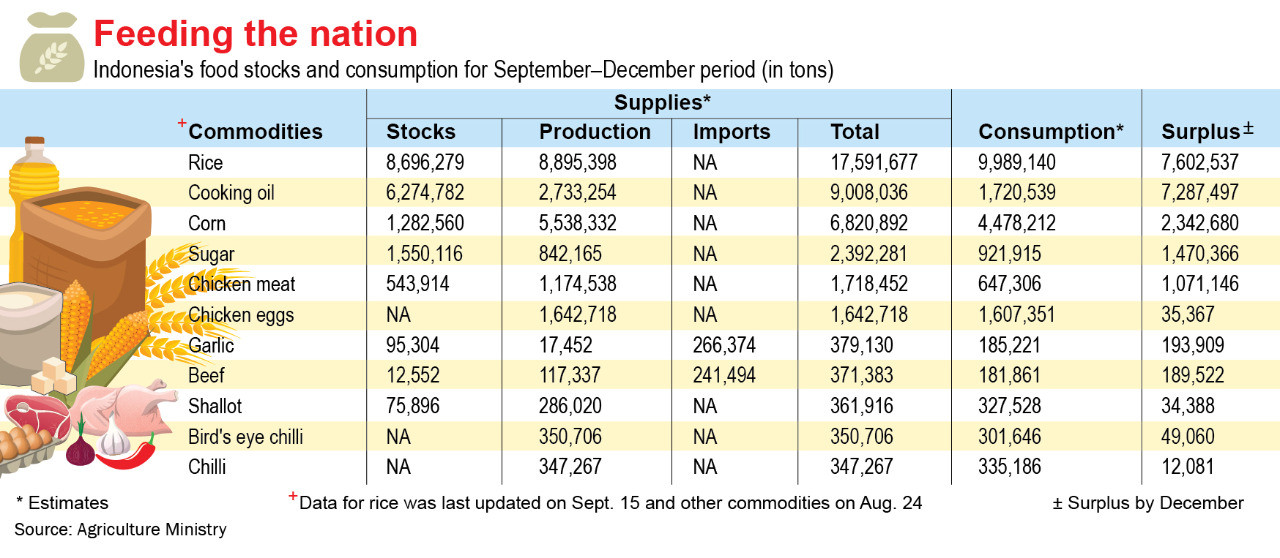Popular Reads
Top Results
Can't find what you're looking for?
View all search resultsPopular Reads
Top Results
Can't find what you're looking for?
View all search resultsExplainer: How Job Creation Law impacts agriculture
However, Bayu Krisnamurthi, the chairman of Indonesian Agribusiness Association (AAI), said on Thursday said that the reason for the lack of investment in the agriculture sector was over-regulation, including the government’s policy on rice prices, which could deter private investors.
Change text size
Gift Premium Articles
to Anyone
A
imed at improving the country’s ease-of-doing-business ranking and boosting food security, the recently passed Job Creation Law officially revises laws related to agriculture, including on investment, imports and land use, but experts are questioning its efficiency and long-term impacts.
The amended laws include Law No. 39/2014 on plantations, Law No. 13/2010 on horticulture, Law No. 18/2012 on food and Law No. 41/2009 on the protection of sustainable food agricultural land.
On the investment front in agriculture, the jobs law removes the 30 percent cap on foreign investment in the horticultural sector, through the revision of Article 100 of the Horticulture Law, according to the latest 812-page draft of the jobs law made available to The Jakarta Post.
The new law also removes Article 131, which stipulates the obligation for foreign investors investing in horticultural businesses to place funds, amounting to the share ownership, in a national bank.
“The removal of articles 100 and 131 contravenes the Constitutional Court decision that strengthens the limitation on foreign ownership to give opportunities to local horticultural businesses,” Henry Saragih, the chairman of the Indonesian Farmers Union, said in a statement on Wednesday.
The jobs law came as the country saw its foreign direct investment (FDI) fall for two consecutive quarters this year, dipping by 6.9 percent year-on-year (yoy) in the second quarter to Rp 97.6 trillion (US$6.63 billion) amid the COVID-19 pandemic.
Meanwhile, FDI realization in the food crops, plantation and livestock sectors stood at $667 million in the January–June period this year, a 31.9 percent yoy increase from $505.4 million in the same period in 2019, according to data from the Investment Coordinating Board.
Bayu Krisnamurthi, the chairman of the Indonesian Agribusiness Association, said on Thursday that the reason for the lack of investment in agriculture was overregulation, including the government’s policy on rice prices, which could deter private investors.
“This investment behavior in agriculture should be viewed more clearly, it’s not the same as investment in the automotive or other sectors,” he said, adding that the jobs law should be assessed on its effectiveness in boosting investment.
The latest draft of the Job Creation Law also amplifies the role of imports in maintaining the country’s food security, amid the government’s efforts to meet national food demand through domestic production.
The jobs law revises articles 14 and 36 of Law No. 18/2012 on food. In the revision of Article 14, imports are cited as one of the priority sources of the national food supply, while the revision of Article 36 also includes the role of staple food imports to meet the national consumption demand, as well as to build up stock, without requiring a prior domestic production shortage.
“There is a very big shift in paradigm in terms of food sources. Previously, it was limited to domestic [production] and food stocks. In the jobs law, we finally acknowledge that imports are a legitimate source of available food,” said Felippa Amanta, the head of research at the Center for Indonesian Policy Studies.
Despite the widespread campaign for self-sufficiency by the government, Indonesia still imports a large amount of its staple foods.
For September to December, the government is planning to source 266,374 tons of garlic and 241,494 tons of beef from abroad, according to data from the Agriculture Ministry.
The country’s import dependency rate for wheat is the highest among all staple foods, standing at 100 percent, and is followed by garlic at 93.7 percent, according to a report released in May by the World Food Programme’s Indonesia office.
Kuntoro Boga, the head of public relations and information bureau at the Agriculture Ministry, said the government’s priority remained meeting the country’s needs through domestic production. The government will not authorize food imports during harvest season to maintain price stability.
“Imports will only be made as a preparation for certain conditions in which we cannot meet the food needs from our own production and stocks. Thus, imports will be the last resort,” Kuntoro was quoted in a statement as saying on Tuesday.
Dwi Andreas Santosa, an agriculture expert from Bogor Agricultural University (IPB), said he was expecting more food imports to have a negative effect on the welfare of many farmers.
When Indonesia allowed imports of soybeans in the 2000s, the price of imported soybeans from the United States was only half of the cost of production for Indonesian soybeans, according to Dwi’s estimate.
“Cane farmers are now on the brink of collapse because of raw sugar imports. If this is left unaddressed, there may no longer be any cane factories based on people’s cane plantations,” the IPB expert added.
Farmers’ terms of trade rebounded to 101.66 in September, according to data from Statistics Indonesia. A reading above 100 suggests an improvement in farmers’ welfare. It is higher than the figure of 99.47 in May, two months after the beginning of the COVID-19 outbreak in Indonesia.










